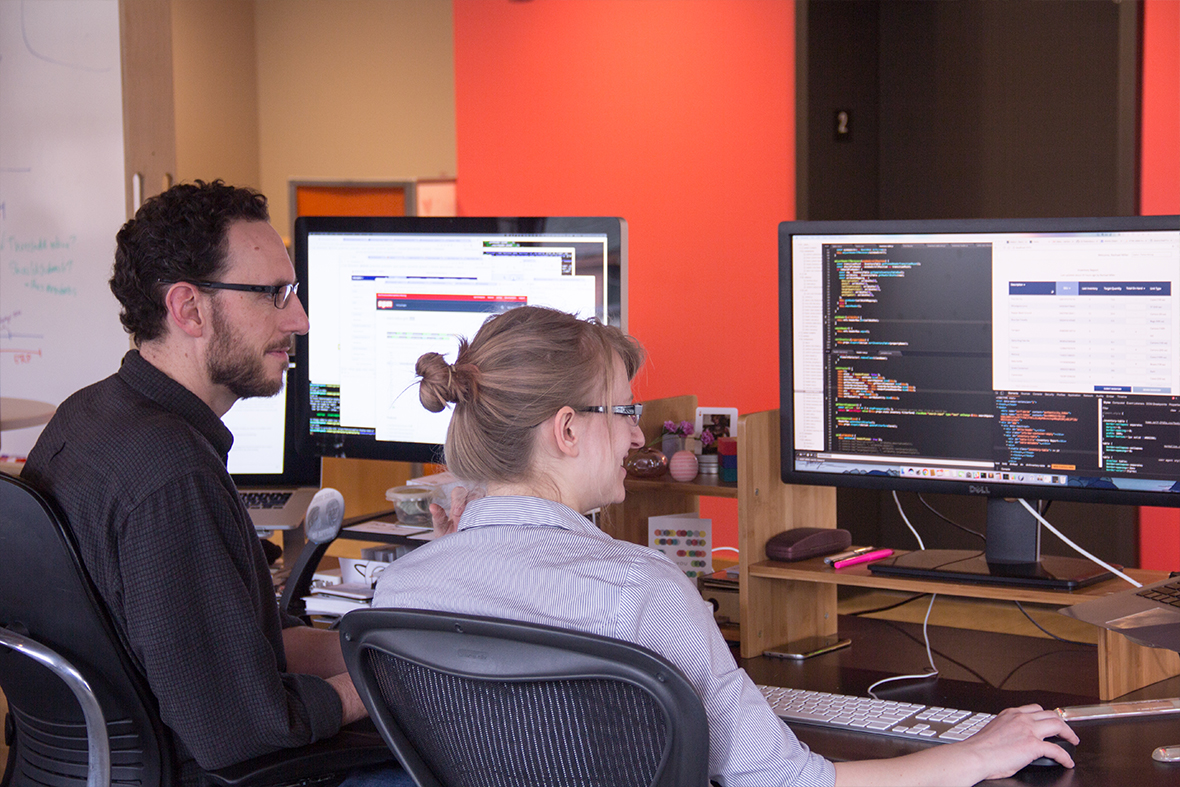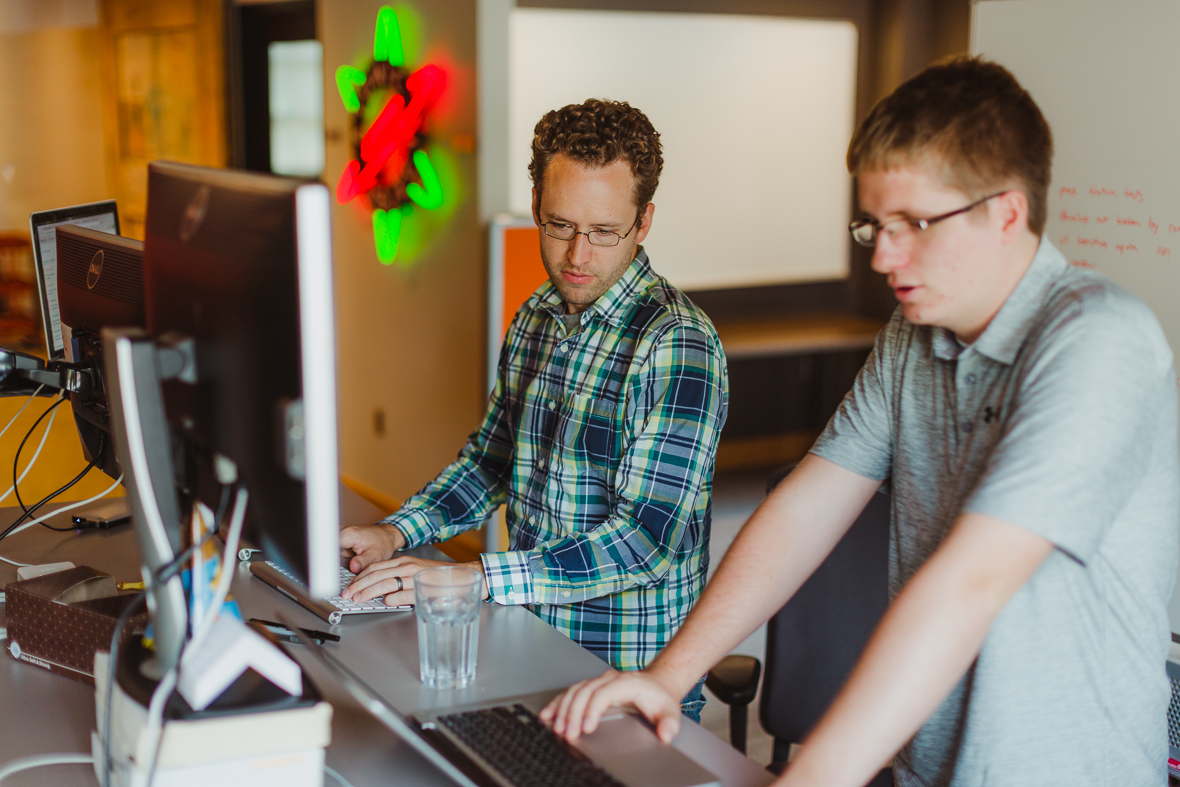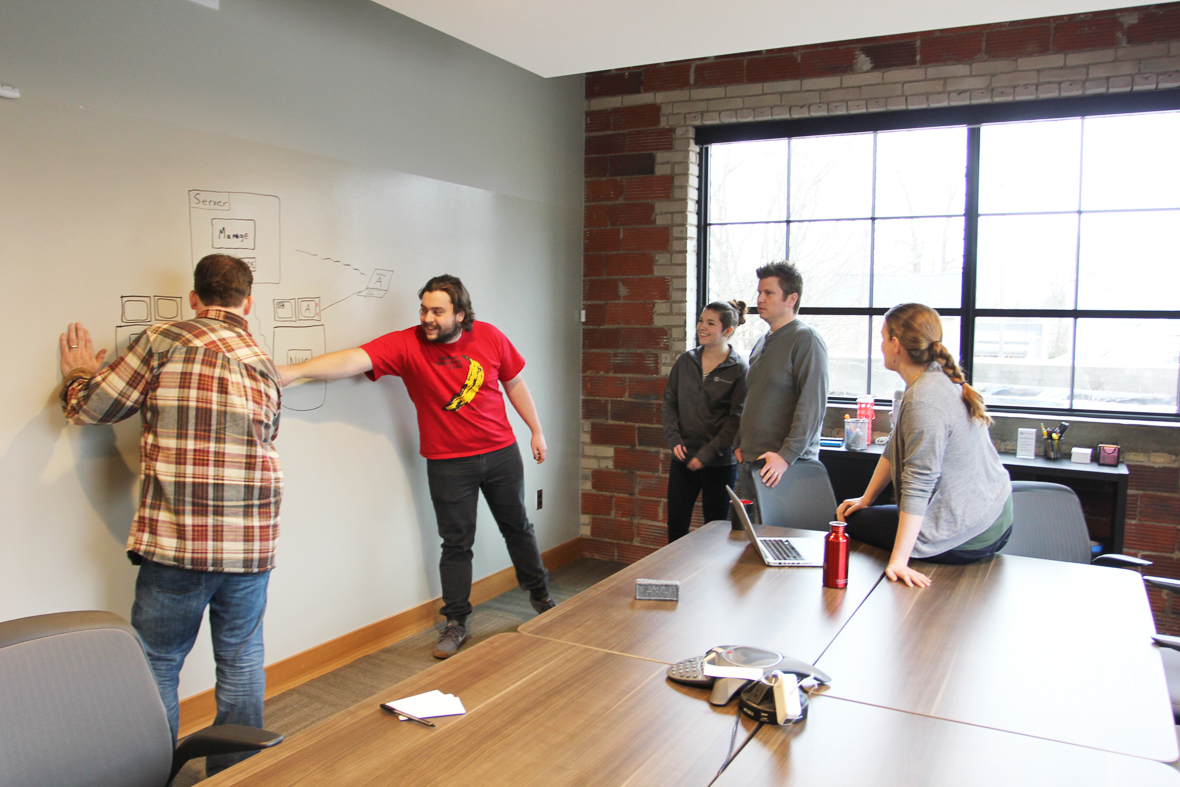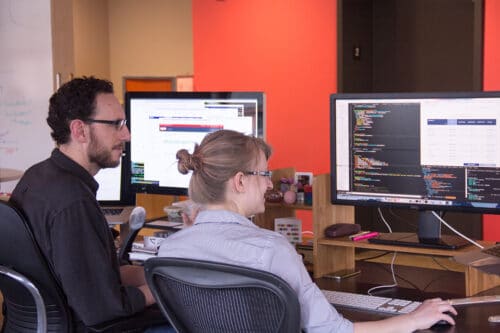Article summary
Atomic’s Accelerator program (an accelerated professional development program for newly-graduated developers) is rounding out its inaugural year. That means the four members of Cell Zero will have completed their first year as Atoms, and Cell One and Cell Alpha (the next cohorts) will join our offices this summer in Grand Rapids and Ann Arbor respectively.
A Year of Experimentation
Reflecting back on the program’s first year, Accelerator Manager Jesse Hill says he expected to learn a lot along the way—and he did.
“The idea was it was going to be an experiment,” he said, “and we were going to make adjustments.”
He says he underestimated Cell Zero’s thirst for technical challenges—even outside their project work. In addition, the cohort ended up shaping their curriculum outside of their responsibilities.
“We had thought that leadership would go in the back rooms and figure out what to throw at the group next,” said Jesse. “What has worked out better is involving the cohort in those decisions and talking through tradeoffs. That’s led to a lot more personal investment on their part; I’m excited to see that.”

Cell Zero Finds “Atomic Zen”
Given Cell Zero’s impact on the program, I wanted to gather some observations and reflections from the first Accelerator cohort. Andy Peterson, Alex Zurek, Dan Kelch, and Rachael Miller shared some ideas to inform the program, its organizers, and participants in Cells to come.
How did being a part of the Accelerator Program differ from your expectations?
Rachael: For a while, I assumed that the program plan was a curriculum written in stone—it turned out to be very much a flexible, living thing that each of us was able to shape for our own needs and goals.
Alex: Atomic works with you to provide excellent mentorship opportunities and guidance, but it is up to you to structure your learning opportunities to fit your needs.
Dan: I was worried that I wouldn’t be able to join a team and immediately start working. I couldn’t have been more wrong. I joined a large project and became a part of the team right away.
Compared to your former classmates who started careers elsewhere, what differences in your first year post-grad do you perceive as a result of being in Cell Zero?
Andy: I’ve had exposure to more languages and tech stacks. Part of this comes from working at a consultancy, but being in Cell Zero allows me to gain a deeper knowledge of these technologies that I come across during my client work.
Rachael: It’s remarkable how much more breadth of skill and knowledge we’ve gained in just one year working at Atomic and doing guided professional development in the Accelerator—over someone who has worked on a single project, in a single tech stack, for a single product at another company.
Dan: I’ve had the chance to work on several projects in different domains, ecosystems, and tech stacks, which has really fast-forwarded my growth.

Have you helped to shape the Accelerator program in its first year?
Rachael: Very much so. We’ve all been working to adapt the program to meet our personal goals. One idea that our Cell introduced is this concept of finding “Atomic Zen”—a place where we feel like the best Atoms we can be. This principle guides the sort of activities and projects that we bring into the Accelerator.
Alex: The program aims to provide mentorship and guidance as needed. The content and structure of the program is malleable. We were able to switch our professional development curriculum from reading-based to project-based when we felt that it was necessary.
Dan: Each of us has the autonomy to individually pursue a certain topic or career goal in our coaching sessions, and as a group, we decide how we would like to spend our time together. Jesse does a great job providing resources and suggestions but leaves it up to us to determine how we spend our time in the Accelerator program.
Andy: I really wanted to learn more about React-Redux, which helped push the group to work on a common project, LunchIt!, giving us all an opportunity to learn a new tech stack, as well as other “team dynamic” soft skills.

What advice do you have for the members of Cells One and Alpha in order to make the most of their first year as Atoms in the Accelerator?
Alex: Be the person that volunteers for the tasks that make you uncomfortable. If you’re afraid of public speaking, give a presentation during lunch. If there’s a feature that seems really tough to implement, assign yourself to it. The more challenging the task, the more you will learn.
Dan: You undoubtedly have the resources to succeed in the Accelerator program, but you have to put in the work.
Andy: If you spend the hours doing the reading and learning the technologies, you’ll see the results in your client work.
Looking Forward
Jesse says he’s glad to see Cell Zero’s pride in shaping the program, and he’s looking forward to Cell One and Cell Alpha’s impact. Finding the members of the next cohort has kept him busy for much of the year.
“It’s fun to do the recruiting and interviewing and figuring out what the next Cell is going to be, and then there’s a period of waiting for the group to arrive,” he said. “I’m super excited about meeting the next Cell in the office.”

